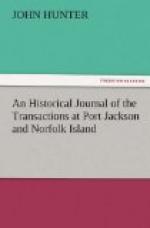On the 5th, a Dutch India ship arrived here from Rio de Janeiro: by this ship I received information of the arrival at that place of two vessels from the east coast of New Holland; that they arrived singly, and in very great distress, from sickness, and the death of many of their people; that the first which arrived, had her name on her stern, (-Prince of Wales, of London_;) from which circumstance, there could be no doubt of its being one of our transports: the other vessel was also so well described, that I knew it to be the Borrowdale store-ship. The officers of this India ship observed farther, that they were so weak, that had they not been boarded by boats without the harbour, they had been unable to bring their vessels into safety.
These ships, I apprehended, had parted company with Lieutenant Shortland, soon after sailing from Port Jackson, and had then determined to go to the eastward by Cape Horn; but they were wrong in my opinion, (and I judge from my own experience,) after passing Cape Horn, in preferring a port at Rio de Janeiro to the Cape of Good Hope, which last place, I have no doubt, they would have reached in less time, and with considerable less fatigue to their sickly crews; beside the advantage of being able to procure more seamen, if they were in want; which I apprehend they will find much difficulty in obtaining at Rio de Janeiro.
As westerly winds are prevalent between Cape Horn and the Cape of Good Hope, if it should so happen that these winds blow more from the north-west than the south-west quarters, their progress to the northward would be but slow along the coast of South America; but from both these quarters it is fair, if bound over to the coast of Africa: and farther, with respect to a passage to Europe, they would have been more conveniently situated at the Cape of Good Hope, than at Rio de Janeiro, for making that passage with expedition; for at Rio you are within the limits of the south-east trade, and upon that coast are consequently to leeward; so that you may be obliged to stretch as far from thence to the southward as the latitude of 30 deg. 00’ south, and sometimes 32 deg. 00’ along that coast, before you can tack and stand to the north-east, in order to be able to cross the equator far enough to the eastward, to ensure a tolerable passage across the north-east trade; but at the Cape, you are far to windward, and steer to the northward with a large wind.




